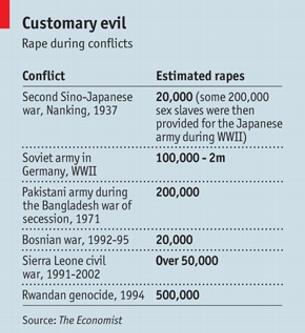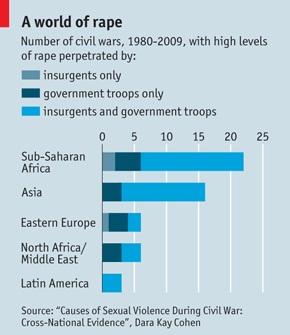Rape as an Act of Genocide
|
Sexual violence as acts of genocide
By Genocide Watch
20 April 2012
Rape and other crimes of sexual violence occur in conflicts all over the world as evidenced by the graphs provided beneath. Rape has become a common weapon of war. It is used to control and terrorize the civilian population. Not only girls and women are victims of such crimes, but also men and boys (read more).
In the context of ethnical conflicts, sexual violence, such as rape and sexual slavery, can be qualified as acts of genocide, even though they are not expressly stipulated in the Genocide Convention of 1948 nor in the Rome Statute of 1998. Rape was declared to be an act committed with intent to destroy a group in part by “causing serious bodily or mental harm to members of the group,” under Article 2, b) of the Genocide Convention. The path breaking decision by the International Criminal Tribunal for Rwanda was the Akayesu case (Case NO. ICTR-96-4-T, 2 September 1998), reiterated in articles 3 and 4 of UNSCR 1820 (2008), which:
"3. Demands that all parties to armed conflict immediately take appropriate measures to protect civilians, including women and girls, from all forms of sexual violence;
4. Notes that rape and other forms of sexual violence can constitute a war crime, a crime against humanity, or a constitutive act with respect to genocide;"
In the Akayesu case the ICTR for the first time accepted that acts of sexual violence can be qualified as acts of genocide. Akayesu, the mayor of Taba, was convicted of genocide because of “aiding, abetting, ordering, or encouraging, and sometimes witnessing, more than two dozen rapes and other sexual assaults at the bureau communal where, by dint of his authority, he could have prevented them”. According to the ICTR sexual violence can be constitutive of genocide by being acts causing serious bodily and mental harm, by imposing conditions calculated to bring about physical destruction (rape victims are often expelled from the community so that its connectedness is weakened and ultimately destroyed), by preventing births (for instance through sexual mutilation, sterilization and forced birth control, but also through rape because of its physical and psychological consequences) and by forcibly transferring children from one group to another group (such as forced pregnancy through rape in patriarchal societies).
Women, men, girls and boys are being raped in conflict and post-conflict settings in countries across the globe, notwithstanding the protection granted to civilians under the Geneva Conventions governing international humanitarian law (jus in bello). The graph “A world of rape” beneath demonstrates that a majority of these crimes are committed by government troops notwithstanding the ratification of the Geneva Conventions. The international community should demand that parties to the Geneva Conventions prevent and prosecute these gross violations of international humanitarian and human rights law.
In many conflict situations, sexual violence is also committed by rebel groups and militias. The applicability of international humanitarian law towards such groups is disputed by some, but Common Article 3 and Optional Protocol II of the Geneva Conventions declare that non-state actors are bound by international humanitarian law when they act on the territory of a Contracting Party to the Geneva Conventions. If non-state Parties commit acts of sexual violence that constitute the crime of genocide or of war crimes or crimes against humanity, they can be held accountable under international criminal law. They can be prosecuted by the International Criminal Court if they have committed those crimes on the territory of a state that has ratified the Rome Statute or if they have the nationality of such a state. If not, the state concerned can still accept the jurisdiction by the ICC by adopting a declaration.
In its cases under prosecution, the ICC has not yet charged individuals with sexual violence as acts of genocide. However, many pending cases include charges of rape, sexual slavery and other acts of sexual violence qualified as crimes against humanity or war crimes. The reason why the ICC is reluctant to include genocide in the charges is the common belief among international lawyers that for genocide proof of “special intent” is required. However, Genocide Watch believes that the intent requirement in the Genocide Convention simply signifies that the acts are committed purposefully to destroy a protected group, in whole or in part. This intent can be deduced from statements or orders or from a systematic pattern of coordinated acts (read article by Dr. Gregory Stanton). A pre-existing plan or policy proving specific intent is not required. Consequently, the prosecutor of the ICC should be more proactive in qualifying rape and other crimes of sexual violence as acts of genocide.
There are many examples of conflicts in which sexual violence is constitutive of genocide. During the Rwandan genocide, for instance, hundreds of thousands Tutsi women were raped. Hutu propaganda, such as the Hutu Ten Commandments, specifically targeted Tutsi women and aimed at creating a general feeling of disdain towards them. These are the two first rules of the Hutu Commandments:
"1. Every Hutu should know that a Tutsi woman, whoever she is, works of the interest of her Tutsi ethnic group. As a result, we shall consider a traitor any Hutu who marries a Tutsi woman, befriends a Tutsi woman, employs a Tutsi woman as a secretary or a concubine
2. Every Hutu should know that our Hutu daughters are more suitable and conscientious in their role as woman, wife and mother of the family. Are they not beautiful, good secreatries and more honest?"
Over the past fifteen years, almost two million women have been raped in the Democratic Republic of the Congo, often because of their ethnical identity (read more). In particular the rapes committed by the FDLR and the Mai Mai towards Tutsi women can be qualified as acts of genocide aimed at destroying the Tutsi community. The consequences of these crimes are aggravated by a general feeling of impunity due to the limited resources of the Congolese judiciary, and contempt for women among the Congolese Army and police, who themselves are guilty of hundreds of thousands of rapes.
- Genocide Watch advocates a large increase in efforts to hunt down and stop perpetrators of sexual violence, carried out by regional African forces with robust funding and training from European and American governments, the UN, and support from MONUC.
- Genocide Watch urges an exponential increase in funding for hospitals, especially to repair fistula and other maiming of women who have been raped.
- Genocide Watch urges investigation and arrest of perpetrators of sexual violence, other crimes against humanity, and genocide by a special unit of the International Criminal Court.
|
Syria: Sexual Assault in Detention
By Human Right Watch
15 June 2012
Syrian government forces have used sexual violence to torture men, women, and boys detained during the current conflict. Witnesses and victims also told Human Rights Watch that soldiers and pro-government armed militias have sexually abused women and girls as young as 12 during home raids and military sweeps of residential areas.
Human Rights Watch interviewed 10 former detainees, including two women, who described being sexually abused or witnessing sexual abuse in detention, including rape, penetration with objects, sexual groping, prolonged forced nudity, and electroshock and beatings to genitalia. Many of the former detainees told Human Rights Watch that they were imprisoned because of their political activism, including for attending protests. In other cases, the reason for the detention was unclear but detainees suffered the same abusive tactics. (read more)
|
 |
| Credit: The Economist |
|
|
 |
| Credit: Dara kay Cohen |
|
|
|
20 April 2012 " Uzbekistan carrying out forced sterilisations, say women," by Natalia Antelava, The Guardian 7 March 2012 " Congo-Kinshasa: The Forgotten Rape Capital of the World," by Felicia Wairagu, Institute for Security Studies 2 March 2012 " Rape as a continuing weapon of war in Darfur," by Eric Reeves 1 March 2012 " The hidden victims of wartime rape," by Lara Stemple, The New York Times 27 December 2011 " For Somali women, pain of being a spoil of war," by Jeffrey Gettleman, The New York Times 31 August 2011 " At least 121 women assaulted by troops last months, says U.N.," by Stephanie Nebehay and Mark Heinrich, Reuters 13 April 2011 " In Ivory Coast, when conflict starts, women become targets," by Elizabeth Pender, The Guardian 11 January 2011 " War's overlooked victims: rape is horrifyingly widespread in conflicts all around the world," by The Economist
|
|